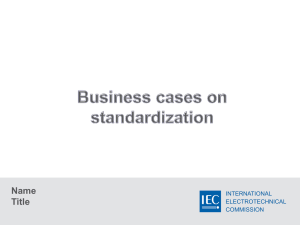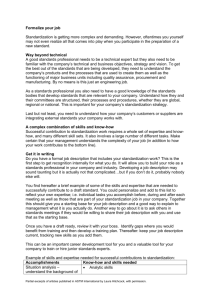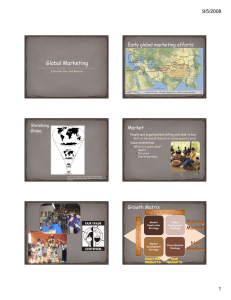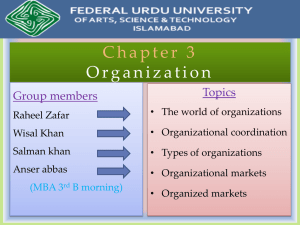UNECE: education on standardization Joint ITU-IEICE-IEEE Workshop on Education about Standardization
advertisement
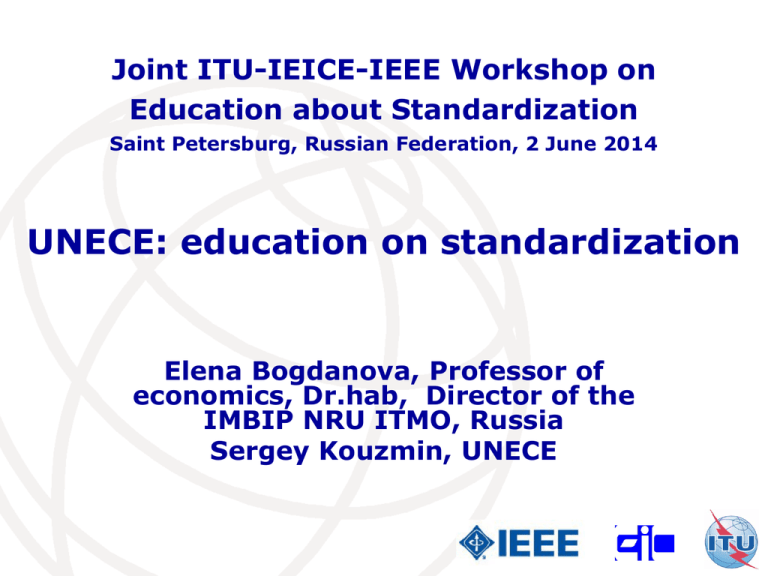
Joint ITU-IEICE-IEEE Workshop on Education about Standardization Saint Petersburg, Russian Federation, 2 June 2014 UNECE: education on standardization Elena Bogdanova, Professor of economics, Dr.hab, Director of the IMBIP NRU ITMO, Russia Sergey Kouzmin, UNECE 50 - 80 % of World Trade is between UNECE Member States (55 Member States, Europe, N. America, CIS) IS CA FI NO EE LV LT DK IE GB NL BE FR PT ES PL DE L CH US SE RU BY CZ UA SK AT HU MD SLHR RO BA YU IT BG AL MK GR TR MT KZ GE AM AZ TM KG UZ TJ CY IL United Nations Economic Commission for Europe Standards at UNECE Examples of standards: •Regulations on the construction of vehicles (WP.29) •Quality standards on agricultural produce (WP.7) •Trade facilitation and e-business (UN/CEFACT) •Transport of dangerous goods, of perishable foodstuffs, … •n “Crisis Management” and “Risk management in Regulatory systems” •PaWorking pArty icipation in the development of ISO 31004 Standards at UNECE Examples of groups of standards experts: Working Party on Regulatory Cooperation and Standardization Policies (Working Party 6) World Forum for Harmonization of Vehicle Regulation (WP.29) UNECE WP. 6 What we are: • Intergovernmental body • Participation by: authorities, regional & int’l org, standards-setting bodies, business, certification bodies, test houses, civil society • From all UN Member States • 1970 – 2010: 40+ years Our mandate: • Forum for dialogue on: Standardization Technical regulations Conformity assessment Accreditation Metrology Market surveillance Our activities • • • • Share info & best practice Capacity-building Develop and maintain a set of recommendations Implement a set of initiatives on specific industrial sectors 1970: Education Adoption of Recommendation “I “ Governments encouraged to include standardization in the curricula of educational institutions Education 2012: More than 40 years passed; revised Rec. “I” adopted Few institutions have standards in the curriculum Very different educational approaches Several other institutions have launched initiatives CEN/CENELEC/ETSI Working Group ISO/IEC/ITU work with academia, repository of learning materials Recommendation I Governments should encourage: (a) the introduction of the subject of standardization into the curricula of educational establishments and particularly of universities for students majoring in technical and scientific subjects, as well as in legal, economic and management studies; (b) the enhancement of awareness-raising activities targeted to the business community and regulatory authorities …. (c) the vocational education and training of specialists in standardization, including staff of authorities responsible for trade and customs, also using the expertise and training materials available in national, regional and international institutions (i.e. standards-setting bodies, conformity assessment and accreditation institutions, metrological institutions… ) (d) the further study of standardization issues in order to identify best practices in ensuring that standardization and regulatory regimes contribute to meeting the legitimate concerns of society (e.g. human safety, environment) without creating unnecessary technical barriers to trade.” Curriculum – 14 modules 1. 2. 3. 4. 5. 6. 7. Standardization basics Benefits of standardization for society Standardization and companies National legal and institutional framework Regulatory policies and related institutional mechanisms Managing risks through standards, regulations and regulatory impact assessments (RIAs) Metrology Conformity assessment 9. Market surveillance 10. Management system standards 11. International standardization 12. International trade, standards and regulations 13. Standardization of information requirements and supply chains 14. A practical exercise: Standardization within a company 15. Policy issues and challenges in standardization 8. Who needs standards in a company (source IFAN) How to teach standards at different company’s levels (source IFAN ) Further work on education issues − − − − − Promotion of the revised Recommendation «I» Further work on the UNECE model programme (experiences of its use) Repository of programmes and information materials E-learning modules preparation New areas for donors and education projects for further information “Education on standardization” webpage on UNECE website : http://www.unece.org/trade/wp6/educationo nstandardization.html UNECE Secretariat : Mr (Dr.) S. Kouzmine , manager, education project, Tel (41 22) 917 27 71 ; E-mail : serguei.kouzmine@ unece.org STaRT-ED Group, project on uniform educational standard “specialist in international trade”, professor (Mrs) Elena Bogdanova, Director, Institute International Business and Law (IMBIP), St.Petersburg, Russia, Tel (7 921) 957 53 53; E-mail : elenaleonardovna@mail.ru or imbip@mail.ru
